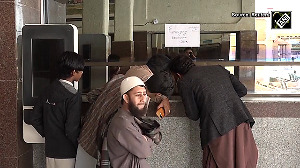In a move to cut down delays in armament procurement, the government Wednesday unveiled new weapons procurement procedures reintroducing the fast track process in modified form and making field trials of weapons systems more transparent.
The new defence procurement procedures and manual-2006 released by the Defence Minister Pranab Mukherjee for the first time also announced a new 'make' procedure to boost indigenous research development and production facilities.
In a major concession and boost to domestic armament industry -- both private and public sector -- the new policy has a provision for providing level playing field for indigenous vendors vis-a-vis foreign players by allowing comparision of prices of foreign vendors with indigenous offers by subtracting excise duty, sales tax and local levies.
Through the new policy, the government has also made amplification of the defence offset implementation policy thereby signalling that international tenders for some of the country's biggest ever defence deals like the acquisition of 126 multi-role combat aircraft may be in the offing.
The request for proposals for the 126 combat aircraft are likely to be issued next month and industry sources say it could be the biggest ever deal by India, running up to or more than $15 billion (about Rs 69,750 crores).
It is not the only mega defence deal coming up. In another big ticket deal worth more than $700 million (about Rs 3,225 crore), the army is to sign an agreement for purchase of 197 helicopters to replace its ageing fleet of Chetaks and Cheetahs. Two firms, Bell Helicopter of the US and European consortium EADS, the maker of Euro-Copter, have been shortlisted and evaluated.
Another major deal would be for the purchase of new 155mm guns upgraded to .52 calibre. India is opting to buy 400 of these upgraded guns whose induction is almost 12 years behind schedule. The army has already conducted three test trials and an unprecedented fourth one is currently on between the Swedish Bofors guns and Israeli Soltam guns.
Apparently stung by criticism over the delay in evaluation, the government has said all field trials of equipment would be made more transparent. "These trials would be conducted on no cost, no commitment basis and equipment of all the vendors would trial evaluated together in field conditions," the defence minister told newsmen after the release of the new policy.
Elaborating on the 'make' procedure, Mukherjee said it has been designed to enable Indian industries develop high technology complex systems and undertake upgrade of weapons required by the armed forces.
"The new policy provides for sharing of development costs with the two vendors identified following a transparent selection process," he said. The minister also said that 'make' would bridge a critical gap in defence procurment procedures and pave way for increased participation of Indian industry in the defence sector.
On the modified fast procedure, Mukherjee said a top down approach would be adopted in which all critical decisions on acquiring weapons platform urgently would be decided in a "collegiate manner" by the defence acquisition council.
The new policy also lays down that in all defence contracts worth more than Rs 100 crore it would be mandatory for both sellers and buyers to sign a pre-integrity pact to avoid all forms of corruption and bringing in undue influence to win contracts. The new policy also amplifies the defence offsets in all deals worth more than Rs 300 crore.
The sellers have been given option on offsets in the shape of direct purchases or executing export orders for defence manufacturers or services provided by Indian defence industries. It says all suppliers of equipment take offsets in the shape of maintenance, overhaul, upgradation of the systems and direct foreign investment in Indian defence industries.






 © 2025
© 2025